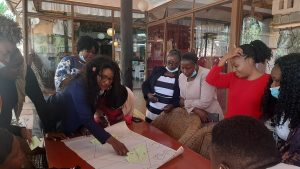SIRP capacitates staff and implementing agencies on gender
SIRP capacitates staff and implementing agencies on gender
-
22nd August 2022
- Posted by: Precious Nkomo

The Smallholder Irrigation Revitalisation Programme last week held a capacity building workshop on the Gender Action Learning System (GALS). The workshop was attended by members of the SIRP Programme Coordination Unit and senior officials from the Ministry of Lands, Agriculture, Fisheries, Water and Rural Development who are based both in Harare and provinces that are implementing the SIRP programme.
The GALS capacity building workshop unpacked the concept of gender and the need to mainstream it with development. Other issues unpacked were the importance of joint decision making in homes on agricultural issues and profit sharing as a way of minimising conflict in communities.
The meeting also agreed that it was important for the Ministry and its partners to understand the social characteristics of labour in the sector as opposed to other inputs such as machinery and draught power. It was also critical to factor in gender issues in the rehabilitation of irrigation schemes, livestock management and post harvest technologies taking into account that technologies chosen by implementing agencies would be used by both men and women and should be user friendly. This was in view of the fact that women constitute 52% of the country’s population and statistics have shown that they make up 81% of the labour in the agricultural sector. Despite these statistics, only 38% of women were paid for their labour. Research carried out by SIRP also showed that 54% of women worked 15 hours per day which was more than their male counterparts on a daily basis and way above the 10 hours’ international standard.
The meeting further noted the need to factor in gender issues in the planning of activities such as training. This was because women had heavier workloads and were often the sole caregivers to children in addition to other agricultural tasks in light of rural urban migration. It was resolved that where possible, trainings should be done within reasonable working hours to accommodate women and where possible, training should be done within communities to allow women to participate. The workshop also agreed that activities such cattle sales should be done in local communities in order to ensure the safety of women and to allow them to carry out other tasks. Farmers often travel at night to ferry their cattle to urban markets.
The workshop also resolved that it was important to take note of sensitivities in certain communities by introducing women only group activities while simultaneously facilitating training to change behavior and negative attitudes towards women empowerment. The workshop also agreed on the need to introduce technologies that saved on time and lessened the burden on women while the assessment of Gender Based Violence (GBV) was to form part of project formulation at every stage.
Addressing participants at the conclusion of the workshop, Chief Director for the Department of Mechanisation, Mr Edwin Zimhunga said “We must implement the lessons learnt and embrace change on this transformational journey. All this remains potential unless we act on it.’

